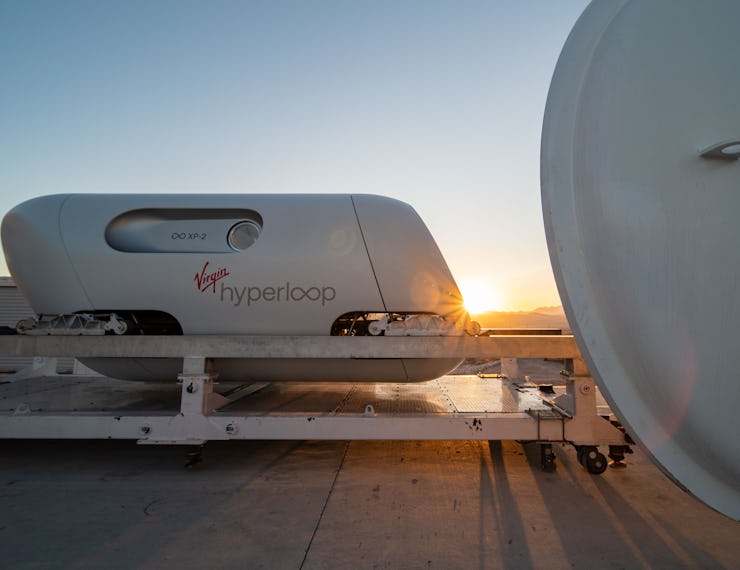107
miles per hour

Virgin Hyperloop co-founder explains why the first ride was so ... slow
Josh Giegel is the co-founder of Virgin Hyperloop, and last month became one of the first people to ride the futuristic system.
by Mike BrownVirgin Hyperloop intends to send pods rushing through a low-pressure tube at 670 miles per hour — but its first passenger test fell short of that.
While speed is impressive, Josh Giegel, a cofounder of the company that became Virgin Hyperloop, tells Inverse that safety is more important in these early days of this new technology proposed by SpaceX founder Elon Musk back in 2013.
In an Inverse interview, shared in Wednesday's Musk Reads+ newsletter, Giegel explains that the test was more about proving the firm is serious and taking the right steps forward.
"Speed doesn’t matter if you’re not safe," Giegel says.
Want to know more about Giegel's historic trip, what the future holds for hyperloop, and when you'll get to take a ride? Don't miss the full interview, available only in Musk Reads+.
Giegel's comments came just after his historic hyperloop trip. The co-founder joined Sara Luchian, another company leader, on a trip that lasted a mere 15 seconds. The pair sat in the specially-designed XP-2 pod, placed inside the 500-meter (1,640 feet) "DevLoop" test track in the Nevada desert.
The pod accelerated for six seconds to reach 107 mph. Luchian told Inverse that it felt like "flooring the gas on a high-end, performance sports car.” The acceleration rate was around three times as fast as Virgin Hyperloop expects to use for public passenger pods.
The XP-2 passenger pod used at the "DevLoop" facility in Nevada where Virgin Hyperloop is developing its tube-transport system that relies on magnetic levitation propulsion inside a near-vacuum tube.
While it was a momentous moment for hyperloop, others questioned the relatively slow pace. Musk's original hyperloop white paper, which outlined the idea, claimed the pods could travel at 760 mph.
Virgin Hyperloop expects the top speed for the passenger or light cargo pods to reach that 670 figure. The Times reported that the pod's 107-mph speed was slower than the 140 mph top speed on some of the United Kingdom's traditional rail lines.
In this week's interview, Giegel explained that these small steps can help enable the giant leaps. He compared it to the space race:
“Look at what happened in the space program. The goal for the Moon was never to just walk in Earth orbit. But the first things they did, like the Gemini program, somebody got out. They showed that they could survive in space, and they showed that they could do all those things. It was this incremental learning approach to get to the ultimate objective.”
Josh Giegel and Sara Luchian.
Separately, Musk is working on his own system of tunnel transportation called the Boring Company, but high-speed pods have been replaced by Teslas in early tests. SpaceX does still host a hyperloop competition for college students, seemingly relying a competitive atmosphere to generate the best hyperloop tech.
Hyperloop teams have managed to reach speeds of up to 288 mph without any passengers. The main difficulty these teams face with reaching higher speeds is distance: TUM Hyperloop told Inverse in August 2019 that it would take around nine miles of track to reach those top speeds.
With SpaceX planning to build a six-mile test track for future competitions, it may not be long before the record is broken. But for Giegel and the team, it seems the main focus is demonstrating that it can ferry passengers safely.
To continue reading the full interview, subscribe to Musk Reads+.
As a token of gratitude to our loyal readers, we’re excited to offer a limited-time discounted rate of 50% OFF to early subscribers. That means you’ll pay just $60 per year if you sign up before December 31, 2020.
Here is what you will gain from subscribing to Musk Reads+:
- Three emails per week, enabling fans to go deeper into the week’s news.
- Original interviews and reporting, longform analysis, previews and recaps of major events, including earnings calls and more.
- Community-focused extras like responses to reader mail, an upcoming event calendar, and notable anniversaries.
- An archive of previous subscriber-only content, so you can easily read back over what you might have missed.
- Promotional deals and offers.
- Supporting original, independent journalism.
- Further extras to be announced.
Musk Reads+ is a fully independent operation. We are not Elon Musk, nor are we employed by him. Our job is to report the events we find newsworthy, giving you the inside look at the worlds of space rockets, electric cars, clean energy, and more. It means first-hand accounts of a SpaceX rocket launch, Tesla insights from third-party analysts, and more.
If you want to support us in our mission, and receive original interviews and analysis, consider contributing with a subscription.